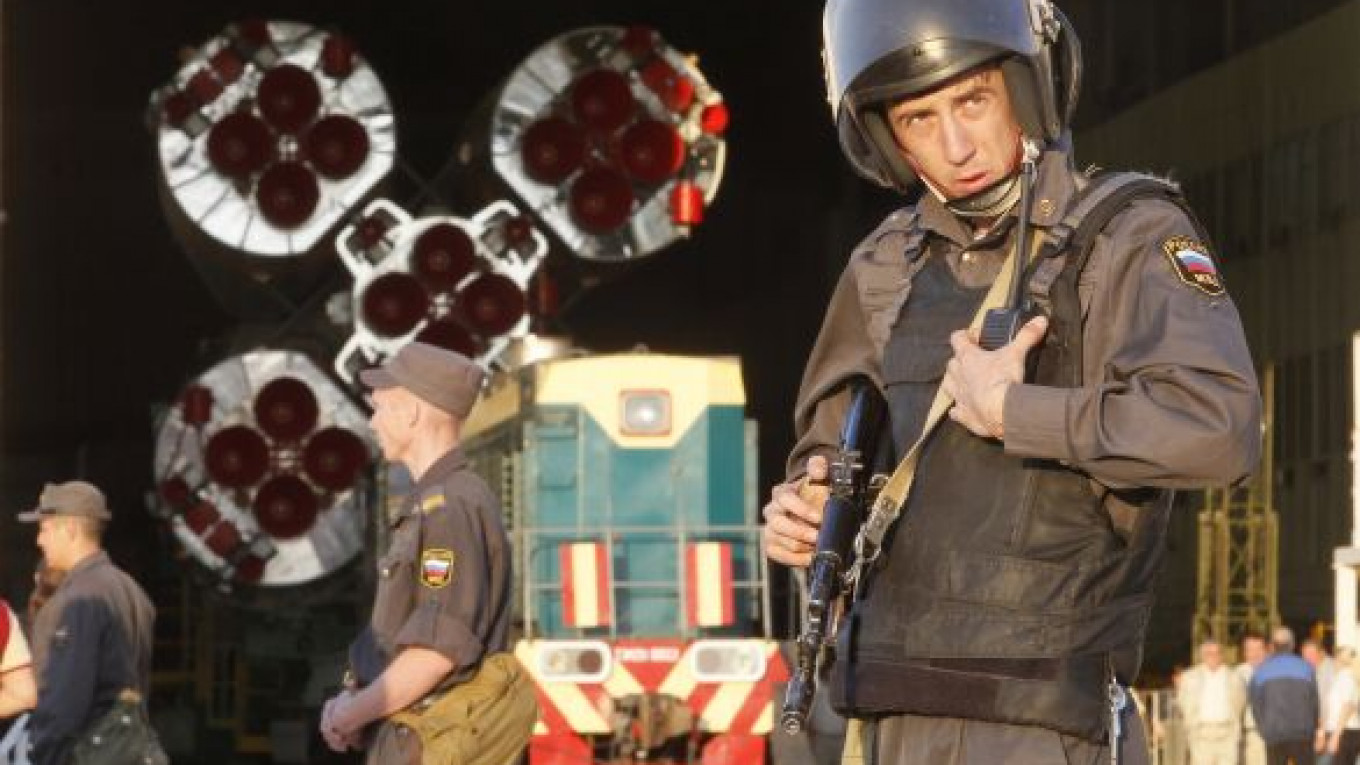BAIKONUR, Kazakhstan — A revamped digital version of the venerable Soyuz spacecraft was winched into place at its launch pad Sunday for its second manned run to the International Space Station.
A crew comprised of cosmonaut Sergei Volkov, NASA's Michael Fossum and Satoshi Furukawa of Japan's JAXA space agency is primed to blast off this week for a six-month stint onboard the orbiting laboratory.
With the U.S. shuttle due to make its farewell voyage in July, the Russian craft takes on renewed importance as the only available lifeline to space.
The new model of the Soyuz craft first blasted off in October from the Baikonur Cosmodrome. By modernizing the operating control system, developers of the Soyuz have made the craft lighter and therefore able to carry up more cargo.
"It's like if you compare a car or a vehicle from 10 years ago, the next generation of vehicles are going to be improved, more efficient and have more capability," said Patrick Buzzard, NASA's representative to Russia.
Although a few minor glitches were registered on the new Soyuz, officials say those have now been resolved.
"There were some software issues that they had the crew in orbit repair last time," said Peggy Whitson, chief of the astronaut corps at NASA. "The next version will have different software, so they won't have the same issue."
In accordance with the rigorous timing and obsession with tradition that is a hallmark of Russian space officials, the Soyuz TMA-02M craft began its slow trek through the tinder-dry Kazakh landscape to the launch pad on a flatbed train just before 7 a.m.
The rocket was carried horizontally to the pad from which Yury Gagarin commenced his landmark voyage to space 50 years ago and was then slowly lifted into place as relatives of the astronauts and officials looked on and took photographs.
Hauling out the rocket to the pad takes two hours, but the wait is usually livened up by customs typical to Baikonur.
Under newly appointed Federal Space Agency head Vladimir Popovkin, who served as deputy defense minister until April, the atmosphere has become more sedate, however. One tradition that visitors were forbidden from observing on this occasion was the laying down of coins on the railway track to be flattened and preserved as good luck keepsakes.
It will be several years before NASA replaces its shuttle fleet, leaving it wholly reliant on the Russian space program to transport its personnel. Meanwhile, the privately run California-based space transportation company SpaceX is developing the Dragon craft, which NASA hopes could also offer it another, possibly less costly, alternative.
The $56 million price that the Federal Space Agency charges NASA to send up astronauts is set to go up to $63 million. A recent contract extension with the agency totaled $753 million and covered trips for a dozen NASA astronauts from 2014 through 2016.
SpaceX scored a major success in December, when its Dragon capsule made the world's first private trip to and from orbit. But Russian officials signaled earlier this year that they could resist the commercial rival by refusing it permission to dock with the International Space Station.
A Message from The Moscow Times:
Dear readers,
We are facing unprecedented challenges. Russia's Prosecutor General's Office has designated The Moscow Times as an "undesirable" organization, criminalizing our work and putting our staff at risk of prosecution. This follows our earlier unjust labeling as a "foreign agent."
These actions are direct attempts to silence independent journalism in Russia. The authorities claim our work "discredits the decisions of the Russian leadership." We see things differently: we strive to provide accurate, unbiased reporting on Russia.
We, the journalists of The Moscow Times, refuse to be silenced. But to continue our work, we need your help.
Your support, no matter how small, makes a world of difference. If you can, please support us monthly starting from just $2. It's quick to set up, and every contribution makes a significant impact.
By supporting The Moscow Times, you're defending open, independent journalism in the face of repression. Thank you for standing with us.
Remind me later.






